Hello students! Looking for reliable solutions to Poorvi Unit 1 Chapter 3 “Rama to the Rescue”?
Our dedicated team of English experts educated both in India and overseas have provided excellent solutions which have addressed all questions and activities in your book thoroughly. You will find answers to all your queries. We recommend that you go through them in detail – they should clear all your doubts and help you understand the story.
Cheers and good luck!
Find Solutions to NCERT Class 6 English Poorvi Unit 1 Chapter 3 ‘Rama to the Rescue’ here.
Text Book Page no 20
Let us do these activities before we read.
1. Identify the following people.
How do they help us when we are in trouble?
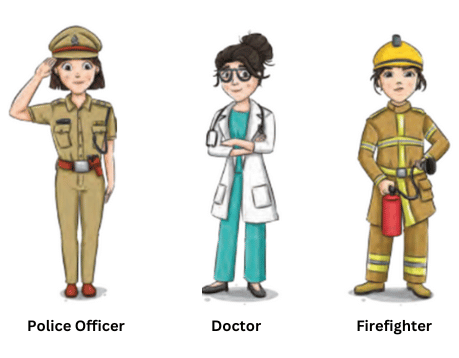
Answer:
(i) Police Officer
Police officers make sure everyone follows the rules. They catch people who break the law and either fine them or arrest them. They keep people safe and help out quickly when there are accidents or fights. They also protect and support people who need help like the elderly. Police officers help build trust in the community through outreach programmes.
(ii) Doctor
Doctors help people get better when they are sick by diagnosing their illness and prescribing the right medicines. They quickly take care of serious health problems and give advice on how to stay healthy. Doctors also treat injuries and illnesses, helping people recover. Doctors often research new ways to treat illnesses.
(iii) Firefighter
Firefighters put out fires and save people and buildings. They rescue people and animals from dangerous situations like when they are trapped inside a burning house or tall building and also during accidents and floods. Firefighters also teach people how to prevent fires and stay safe. Firefighters are important in disaster relief efforts.
2. Choose the correct option to complete the sentence.
The word ‘rescue’ means to ______________________
(a) make fun of someone
(b) save someone
(c) ask someone for help
Answer:
(b) save someone
3. Work in pairs.
Put a tick mark at the end of the phrases describing those who need to
be rescued. Share your answers with your teacher and classmates.
(a) A man stuck in a building on fire.
(b) A woman buying vegetables in the market.
(c) A dog who has hurt its leg.
(d) A tree being cut down in a forest
Answer:
(a) A man stuck in a building on fire. ✔
(b) A woman buying vegetables in the market.
(c) A dog who has hurt its leg. ✔
(d) A tree being cut down in a forest. ✔
4. The policeman in the story you are about to read is called the kotwal. Some people call him thaanedar. What do you call a policeman in your language? Share it with your classmates and teacher.
Answer:
In my language, we call a policeman “policewala.”
5. Imagine you are alone at home and you face a problem. Answer the following questions and share your answers with your teacher and classmates.
(a) Will you solve the problem yourself or wait for someone to help you?
Answer:
I will actively try to solve the problem myself instead of waiting for someone to help me.
(b) How will you deal with the problem? Give a reason.
(i) Be worried about the problem and give up.
(ii) Feel angry that only you have the problem.
(iii) Think quickly about ways to solve the problem.
Answer:
If I face a problem when I am alone at home, I won’t waste time worrying because it doesn’t solve anything. Instead, I must be proactive and take concrete steps to address the issue myself. Anger will only complicate matters, so I need to stay calm and think clearly. By finding a quick solution, I can resolve the problem swiftly and effectively, relieving myself from unnecessary anxiety.
Text Book Page no 22
Let us discuss
Circle the odd one–
1. The characters are: husband, wife, children
Answer: the odd one out is ‘children’.
2. Who entered the house? guest, robber, Kotwal
Answer: the odd one out is ‘guest’.
Text Book Page no 23
Let us discuss (Page 23)
Write whether True or False.
1. The man tells his plan to his wife.
2. The thief wants to know where they kept their jewels.
Answer:
1. The man tells his plan to his wife. True
2. The thief wants to know where they kept their jewels. False
Text Book Page no 24
Let us discuss
1. Along with your classmates, call out the name ‘Rama’– softly, loudly and very loudly.
Answer:
Call out the name ‘Rama’ softly, loudly and then very loudly.
2. What do you think will happen next in the story?
Answer:
I think Rama, the village kotwal will hear his name being called out and rush over to catch the robber.
Text Book Page no 25
Let us discuss
1. Work in pairs to match the words in Column A with the meanings in Column B. Check your answers by sharing them with your teacher and classmates.
| Column A | Column B |
| 1. wonder | (a) in place of someone or something |
| 2. yard | (b) carefully |
| 3. chatter | (c) an area outside a building |
| 4. instead | (d) talk for a long time about unimportant things |
| 5. closely | (e) maybe |
| 6. perhaps | (f) a feeling of surprise |
Answer:
| Column A | Column B |
| 1. wonder | (f) a feeling of surprise |
| 2. yard | (c) an area outside a building |
| 3. chatter | (d) talk for a long time about unimportant things |
| 4. instead | (a) in place of someone or something |
| 5. closely | (b) carefully |
| 6. perhaps | (e) maybe |
2. Fill in the boxes with suitable words as you read the story.
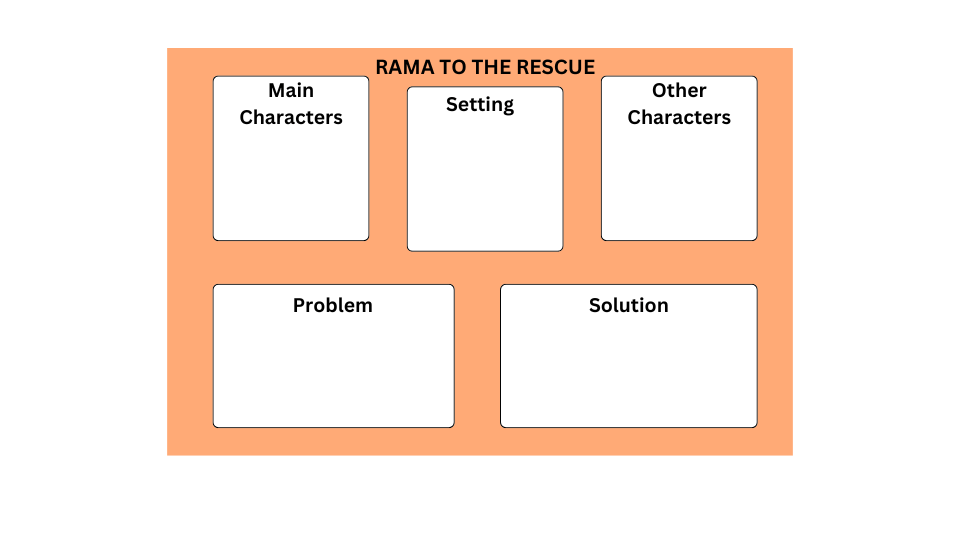
Answer:
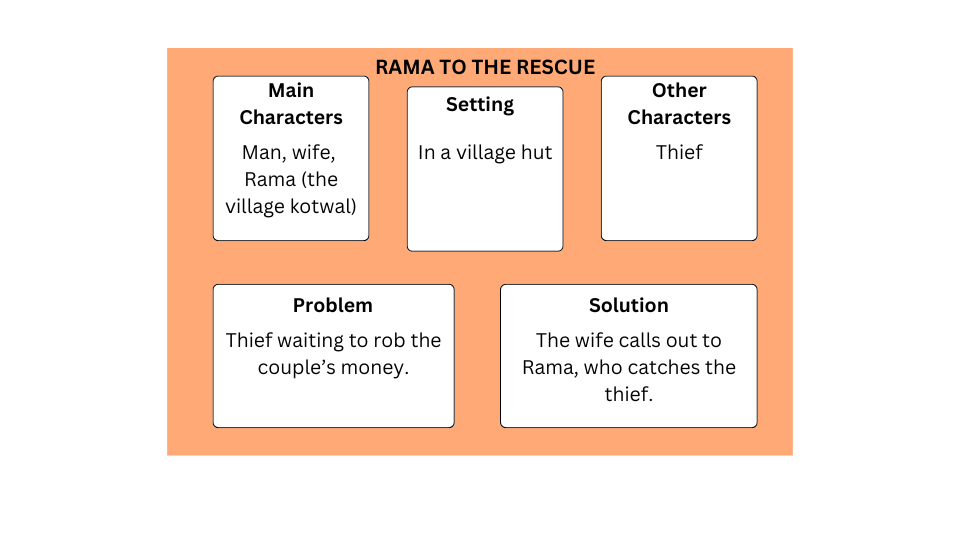
Text Book Page no 26
Let us think and reflect
1. Read the following lines and then answer the questions that follow.
(a) Man: What’s the matter? What are you looking at?
Wife: Ssssh! Listen!
Man: Somebody is trying to get in.
Wife: I … I think he has got in … the noise has stopped.
(i) What makes the man say the first line?
Answer:
The man says these words because he notices his wife staring anxiously at something.
(ii) Choose the correct option.
The wife says ‘Ssssh! Listen!’. What does the word ‘Ssssh’ mean here?
a. sleep
b. help
c. rest
d. be silent
Answer:
d. be silent
(iii) How can you tell that the wife was listening carefully?
Answer:
We can tell that the wife was listening intently because she notices as soon as the noise stops.
(b) Rama, the village kotwal, ran to the house from which he heard his name being called.
Rama: Oh, Oh! Some thief has dug his way into this house.
(i) Fill in the blank with the correct word from the given lines.
The villagers caught the thief and took him to the_____________________.
Answer:
The villagers caught the thief and took him to the kotwal.
(ii) Choose the correct option.
What do the words “Oh, oh!” show here?
a. surprise
b. anger
c. pain
d. happiness
Answer:
a. surprise
(iii) How can you tell that the kotwal was good at his job?
Answer:
We can tell that the kotwal was good at his job because he responded immediately to the call, assessed the situation and caught the robber. His timely action and ability to handle the situation demonstrated his skill and dedication to his duties.
2. Give one reason why the man and his wife were not able to fall asleep.
Answer:
The man and his wife were not able to fall asleep because they heard someone break into their house, so they were worried and anxious.
3. What did the thief wish would happen? Did it happen?
Answer:
The thief wished that the couple would either talk about where they had kept their money or fall asleep. No, it did not happen because the couple found a clever way of calling the kotwal without arousing the thief’s suspicion.
4. How did the man and his wife get help from the kotwal?
Answer:
The man and his wife got help from the kotwal by cleverly finding a way to call out his name aloud and attract his attention. Rama heard his name being called after the thief broke in. So, he rushed to the couple’s house and caught the thief.
5. Do you think cleverness can help us solve our problems? Why do you say so?
Answer:
Yes, cleverness can help solve problems because it allows us to think quickly and find innovative solutions. Being clever can help us remain calm and in control of the situation so that we can find creative ways to face the challenge just as the couple did in the story.
Let us learn (Page 27)
1. Study the highlighted words in the following lines.
• I’m feeling so sleepy…
• It’s a thief.
• They’re awake.
The highlighted words given in the above sentences have one letter missing in each. What are they? Share them with your teacher and classmates.
Now, write the full words with the missing letter.
The missing letters are marked by an apostrophe (ʼ).
Answer:
(a) I am feeling so sleepy… (‘a’ was missing)
(b) It is a thief. (‘i’ was missing)
(c) They are awake. (‘a’ was missing)
2. Expand the following words. Two examples have been done for you. Use the contracted form of these words in sentences of your own.
| Serial no | Contracted form | Expanded Form | sentences |
| (a) | What’s | What is | What’s the time now? |
| (b) | I’ll | I will | I’ll try to get up early tomorrow morning. |
| ( c ) | I’d | I would | I’d love to go to Paris to watch the Olympics. |
| (d) | we’ll | We will | We’ll rest for a while before going up that hill. |
| ( e ) | that’s | That is | That’s the way to the zoo. |
| (f) | we’re | We are | We’re thrilled because we won the hockey match against our rival school. |
| (g) | don’t | Do not | Don’t touch any of the flowers in the garden. |
| (h) | You’ll | You will | You’ll definitely succeed if you work hard. |
| (i) | must’ve | Must have | I must’ve have left my phone at home. |
3. Study the highlighted words and the words in the brackets in the following sentences from the story.
(a) I am feeling so sleepy. [am + feel + ing]
(b) What are you looking at? [are + look + ing]
(c) Somebody is trying to get in. [is + try + ing]
(d) They are saying something. [are + say + ing]
(e) Perhaps, they are talking about their money. [are + talk + ing]
Now, choose the correct option.
The sentences (a)-(e) refer to actions that _________________.
[are going on at the time of speaking/happened in the past/will take
place in the future].
Answer:
The sentences (a)-(e) refer to actions that are going on at the time of speaking.
Verbs that describe what someone or something is doing at the moment of speaking are in the present progressive tense.
4. Fill in the blanks to complete the following sentences.
(a) I ______________ in Grade 6. [am + study + ing]
(b) My friend ______________ a story book. [is + read + ing]
(c) We ______________ a board game. [are + play + ing]
(d) I ______________ a new language. [am + learn + ing]
(e) The teachers ______________ in the staff room. [are + sit + ing]
(f) My mother ______________ food in the kitchen. [is + cook + ing]
Answer:
(a) I am studying in Grade 6. [am + study + ing]
(b) My friend is reading a story book. [is + read + ing]
(c) We are playing a board game. [are + play + ing]
(d) I am learning a new language. [am + learn + ing]
(e) The teachers are sitting in the staff room. [are + sit + ing]
(f) My mother is cooking food in the kitchen. [is + cook + ing]
5. Study the picture on Page 29 and fill in the blanks with the present progressive form of verbs.
(a) Govind and Anu _____________ football.
Answer:
Govind and Anu are playing football.
(b) Pema ___________ flowers.
Answer:
Pema is touching flowers.
(c) Anil _____________ the scorecard.
Answer:
Anil is holding the scorecard.
(d) The mother ___________ a book.
Answer:
The mother is reading a book.
(e) The dog __________ to catch the ball.
Answer:
The dog is running to catch the ball.
(f) The birds _________ in the sky.
Answer:
The birds are flying in the sky.
6. Study the following sentences from the story and complete the table.
One example has been done for you.
(a) I’d better listen closely.
(b) When he’s in the house, I’ll call out softly to him.
(c) Then I’ll call out very loudly…
| Serial no | Sentence | Question | Word |
| 1. | I’d better listen closely | How does he listen? | closely |
| 2. | When he is in the house, I’ll call out softly to him. | How does she call out? | |
| 3. | Then I’ll call out very loudly. | How does she call out? |
Words that give more information about the verb, such as how, when, where, etc. are called adverbs.
Answer:
| Serial no | Sentence | Question | Word |
| 1. | I’d better listen closely | How does he listen? | closely |
| 2. | When he is in the house, I’ll call out softly to him. | How does she call out? | softly |
| 3. | Then I’ll call out very loudly. | How does she call out? | loudly |
7. Fill in the blanks with suitable adverbs from the box given below. There are two extra words that you do not need.
| warmly | gracefully | smoothly | beautifully | funnily | quickly | hurriedly |
(a) He solved the mathematics problem _____________.
(b) The car moved _____________ along the highway.
(c) The musician played the guitar _____________.
(d) Shobha danced _____________.
(e) Rohit left the house _____________.
Answer:
(a) He solved the mathematics problem quickly.
(b) The car moved smoothly along the highway.
(c) The musician played the guitar beautifully.
(d) Shobha danced gracefully.
(e) Rohit left the house hurriedly.
Question 8.
Fill in the blanks with suitable adverbs from the box given below. There are two extra words that you do not need.
| honestly | brightly | peacefully | sweetly | angrily | slowly | tirelessly |
Once upon a time in a small forest, animals lived (i) ___________. The wise old tortoise moved (ii) ___________ but always won the race against the proud rabbit. The ants worked (iii) ___________, gathering food for the winter. The kind-hearted lion ruled the jungle (iv) ___________, giving everyone a chance to speak. The birds sang (v) ___________, making everyone in the forest happy.
Answer:
Once upon a time in a small forest, animals lived (i) peacefully. The wise old tortoise moved (ii) slowly but always won the race against the proud rabbit. The ants worked (iii) tirelessly, gathering food for the winter. The kind-hearted lion ruled the jungle (iv) honestly, giving everyone a chance to speak. The birds sang (v) sweetly, making everyone in the forest happy.
9. Study the following sentences from the story and choose the correct option.
(i) Oh, hum! What a hard day it has been!
(ii) Ah, at last, they’ve stopped their chatter!
(iii) What should we do?
(iv) What should we name our child?
a. Sentence (i) expresses a feeling of __________. (tiredness/joy)
b. Sentence (ii) expresses a feeling of __________. (wonder/relief)
c. Sentences (iii) and (iv) ask __________. (answers /questions)
Answers:
a. Sentence (i) expresses a feeling of tiredness. (tiredness/joy)
b. Sentence (ii) expresses a feeling of relief. (wonder/relief)
c. Sentences (iii) and (iv) ask questions. (answers /questions)
10. Punctuate the following sentences and write whether they are exclamatory or interrogative sentences.
(a) Wow, what an intelligent man he is
(b) Oh how big the hole is
(c) Do you like to read comic books
(d) What is your favourite story
Answers:
(a) Wow, what an intelligent man he is! (Exclamatory)
(b) Oh, how big the hole is! (Exclamatory)
(c) Do you like to read comic books? (Interrogative)
(d) What is your favourite story? (Interrogative)
Sentences that express a strong feeling are called exclamatory sentences. They are marked by an exclamation mark (!).
Sentences that ask questions are called interrogative sentences. They are marked by a question mark (?).
Let us listen (Page 32)
You will listen to a security guard making an announcement to the people in the neighbourhood. As you listen, fill in the blanks with only one word that you hear. (refer to page 38 for transcript)
The security guard announced that (i) ____________ has been happening in that area. He advised everyone to stay safe and the kids to tell the (ii) ____________ as soon as they find anything different. They should not forget that (iii) ____________ is the main thing. He asked them to call (iv) ____________ when they need immediate help.
Answer:
The security guard announced that (i) robbery has been happening in that area. He advised everyone to stay safe and the kids to tell the (ii) adults as soon as they find anything different. They should not forget that (iii) safety is the main thing. He asked them to call (iv) 100 when they need immediate help.
Let us speak (page 32)
1. Listen to your teacher pronounce the contractions and repeat after your teacher.
| I’ll | It’s | Don’t | I’m | I’d | he’s |
| that’s | we’ll | they’re | you’re | we’re | what’s |
We use contracted form of the verbs while speaking and expanded form of the verbs while writing.
Now, speak these contractions clearly along with your teacher and classmates.
| can’t | won’t | I’ve | wouldn’t | shouldn’t | didn’t |
Answer:
Practise saying these abbreviations repeatedly till they become easy to pronounce. You can practice with your classmates. Quiz each other till all of you get them right and they become familiar so that you can use them in everyday conversation.
2. Discuss in pairs:
(a) Why do you think it’s important for people to keep their house and themselves safe? Tick the suitable reasons.
(i) To be safe from injury
(ii) To keep family members and pets safe
(iii) To stop accidents from happening
(iv) To make sure they visit the doctor regularly
(v) To stop robbery
(vi) To pay the electricity bill
(vii) To save money
Answers:
(i) To be safe from injury [✔]
(ii) To keep family members and pets safe [✔]
(iii) To stop accidents from happening [✔]
(iv) To make sure they visit the doctor regularly [ ]
(v) To stop robbery [✔]
(vi) To pay the electricity bill [ ]
(vii) To save money [ ]
(b) Now, use the given hints to share your reasons in complete sentences with your teacher and classmates.
• I think it’s important because … /
• I feel it’s necessary as … /
• The reason we need to look at safety is …
Answer:
I think it’s important because we must be safe from injury so we don’t get hurt.
I feel it’s necessary as we must protect our family members and ensure that our pets safe.
The reason we need to look at safety is to stop accidents from happening and keep things secure.
(c) Use the given hints to share three ideas on how people can keep their houses and themselves safe. Share with your classmates and teachers.
• I think they should … /
• I suppose they could … /
• They must … /
• They should … /
• How about … /
• It might be better to …
Answers:
I think they should install security cameras and alarms to scare away thieves.
I suppose they could check and fix electrical appliances and fixtures regularly to stop fires.
They must lock doors and windows properly to keep intruders out.
They should have a first aid kit and know basic first aid for emergencies.
How about installing fire extinguishers and teaching all family members to use them?
It might be better to keep all dangerous objects out of reach of children to prevent accidents.
Text Book Page 34
Let us write
The next day, the neighbour asked the man in the story about what had happened. As the man, tell the neighbour what had happened in your own words. Remember to include the following:
when …………………………………………………………………….
where …………………………………………………………………….
what …………………………………………………………………….
how …………………………………………………………………….
why …………………………………………………………………….
You may begin this way:
My wife and I were about to go to sleep last night when we heard someone …
Answer:
My wife and I were about to go to sleep last night when we heard someone trying to break into our house! Soon, the noise stopped, so we knew the thief was inside.
I had an idea to call for help without alerting the thief. I whispered the plan to my wife. We started talking loudly about naming our future child “Rama” and practised calling his name softly as if he were in the room. Then, we called out “Rama” louder as if he were in the yard, and finally, very loudly as if he were on the street.
The thief didn’t know that the village kotwal was named “Rama.” He thought we were just chatting, but we were really trying to alert the kotwal. Our plan worked! The kotwal heard us and rushed over to catch the thief. Thanks to our clever idea and the kotwal’s quick response, our home is safe. My wife and I are proud of ourselves for outwitting the thief.
Text book Page no 34
Let us explore
Question 1.
Find out from your teacher or parents what you would do in the following situations.
Who will you call if …
• you see fire
• you see someone getting hurt
• you see a wounded animal
• you see someone suspicious
• you find a lost child
• you get lost
Answer:
If I see a fire: I will call the fire department.
If I see someone getting hurt: I will call an ambulance or emergency medical services.
If I see a wounded animal: I will call an animal rescue centre or veterinarian.
If I see someone suspicious: I will call the police.
If I find a lost child: I will call the police or child helpline.
If I get lost: I will call my, parents, guardians, or the police for assistance.
Text Book page 35
2. Find the right path for the kotwal to catch the thief.
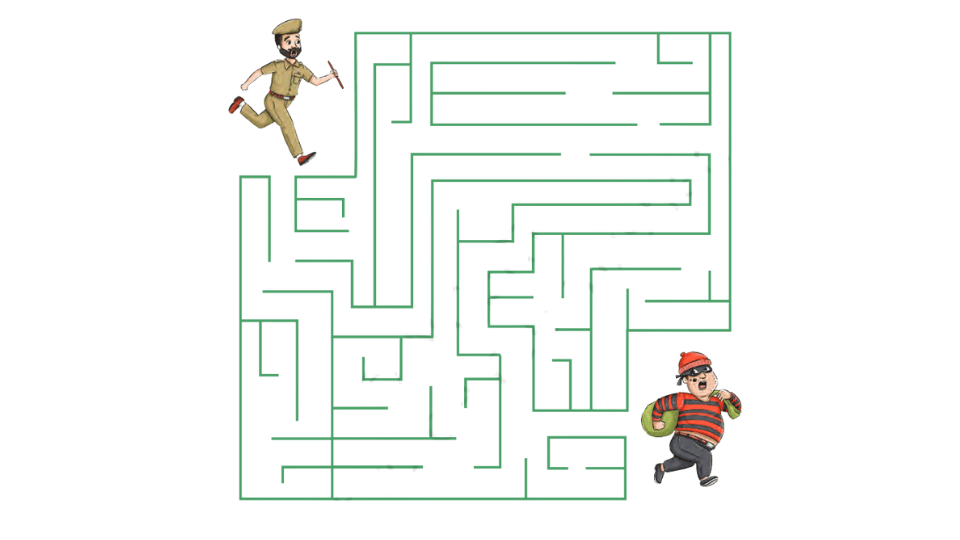
Answer:
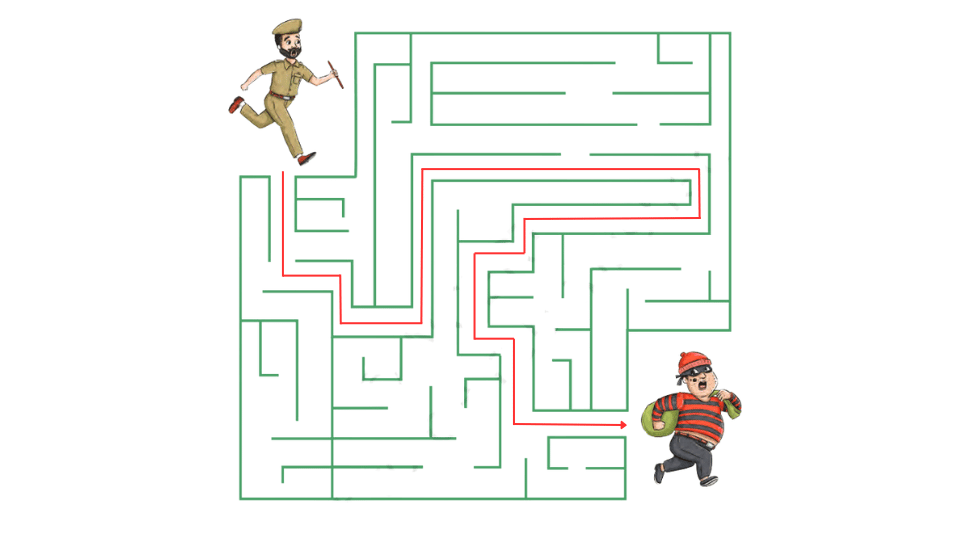
Frequently Asked Questions (FAQs) on Solutions to NCERT Class 6 English Poorvi Unit 1 Chapter 3 ‘Rama to the Rescue’
Our sincere endeavour is to help you appreciate and understand the story and also to guide you to improve your communicative skills in English. So, our team of English experts, who have been trained both in India and abroad, have presented you with an accurate and detailed analysis of the story in the most easy-to-understand way possible. Every possible query has been answered in detail, along with clear explanations, wherever possible. We recommend that you go through them in detail to extract maximum benefit from them.
Feel free to download the free PDFs of the solutions anytime! There’s plenty more helpful study material and other resources on the way – so keep visiting our website and join our email list to get free access to them! (insert hyperlink)
You must first read the piece yourself and familiarise yourself with the meanings of new words that you encounter. This step is necessary not only for understanding the lesson, but also to improve your vocabulary. Then, go through the solutions prepared by us paying close attention to the details. We have provided you with guidance for not only all questions but also for all activities in the book. The key lies in understanding the message that the writer wants to convey. Do go over our exhaustive solutions before the exam to boost your confidence.
Yes indeed! You can download the free PDF versions of the solutions anytime (please look towards the top of the page)!
The comic ‘Rama to the Rescue’ is about a couple who narrowly foiled a robbery attempt by cleverly using their village Kotwal’s name, “Rama,” in their conversation. While the thief was lying in wait for them to fall asleep, they began to talk about future baby names and the wife pretended to call out repeatedly to “Rama” gradually raising her voice louder and louder in the hope that the Kotwal would hear and come to their aid. Their plan worked, and the Kotwal arrived just in time to catch the thief, saving their home and valuables.
Yes, certainly! Our team of seasoned and competent English teachers have considered all aspects of your needs while crafting these comprehensive solutions. The answers have been framed keeping in mind the expectations of your examiners.
We suggest that you read the text thoroughly and then go through all the questions we have thoughtfully provided – both the questions at the back of the book and the in-text activities.
Then, you need to practise writing down the answers within a specific time frame. This is an important step which will boost your confidence and enable you to ace the exams.
Good Luck!
Are you feeling uncertain about your studies or future?
It’s completely normal to feel this way, and you don’t have to face it alone. We understand the pressure, and we’re here to provide the guidance you need.
At educationroundtheworld.com, we believe in empowering students by connecting them with experienced teacher-mentors who truly care about their success. Our mentors will help you navigate through any confusion, offering personalized support to help you thrive.
Book your first appointment and we’ll work together to develop a customized study plan tailored to your strengths and goals. With our expert guidance, you’ll build the confidence and skills needed to achieve your full potential.
Don’t let stress hold you back. Start your journey to success today with the support you deserve!


